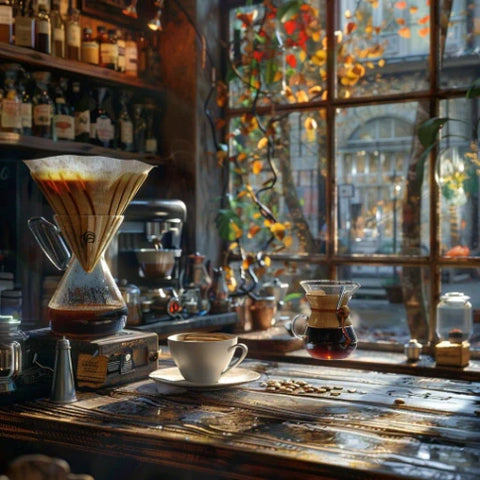Brazilian coffee is a popular and beloved beverage known for its rich flavor and smooth taste. It is produced in Brazil, the largest coffee producer in the world, and is enjoyed by millions globally. If you're a coffee lover, then Brazilian coffee is a must-try for its unique characteristics and history. In this guide, we'll take a closer look at all things Brazilian coffee and why it's worth adding to your daily routine.
Brazilian coffee is coffee produced in Brazil, typically from the Coffea Arabica plant. It is the largest export in Brazil, making up for around one-third of the world's coffee production. The coffee is grown in various regions across Brazil, including Minas Gerais, São Paulo, and Paraná.
Read: The Beginner's Guide To Coffee Varieties
Brazilian coffee is known for its unique production process, which includes the use of both natural and washed processing methods. This results in a variety of flavor profiles that make Brazilian coffee stand out from others. Some popular types of Brazilian coffee include Bourbon, Caturra, and Mundo Novo.
The history of Brazilian coffee dates back to the early 1700s when the crop was first introduced to the country. Brazil quickly became the world's leading coffee producer, and its economy was heavily dependent on coffee exports. Today, coffee remains a significant part of Brazil's culture and economy.
Brazilian coffee is traditionally prepared using a cloth filter and a wooden stand called a "sock" or "filter holder." This unique method results in a smooth, full-bodied cup of coffee. However, there are now various methods of brewing Brazilian coffee, including using a French press or Aeropress.
Some popular Brazilian coffee drinks include:
- Café com Leite (coffee with milk)
- Café Pingado (espresso with a drop of milk)
- Café Gelado (cold coffee)
These drinks are often enjoyed during breakfast or as an afternoon pick-me-up.
In addition to its delicious flavor, Brazilian coffee also has numerous health benefits. It is high in antioxidants and can improve brain function, boost metabolism, and lower the risk of diseases such as Alzheimer's and Parkinson's. And contrary to popular belief, Brazilian coffee does not have more caffeine than other types of coffee.
Sustainability is a significant concern in the coffee industry, and Brazil is making efforts to promote sustainable coffee production. This includes initiatives to reduce deforestation, promote eco-friendly farming practices, and support fair wages for coffee farmers.
Incorporating Brazilian coffee into your daily routine is easy and enjoyable. You can try different types of Brazilian coffee, experiment with different brewing methods, or even add it to baked goods for a unique flavor. So why not grab a cup of Brazilian coffee and samba your way to happiness?
Key Takeaways:
What Is Brazilian Coffee?
What Is Brazilian Coffee? Brazilian coffee is renowned for its mild, nutty flavor with a subtle hint of chocolate. This type of coffee is commonly used in espresso blends because of its low acidity and smooth taste. The beans are typically harvested from regions such as Minas Gerais and São Paulo, where the climate and altitude play a significant role in creating its distinctive flavor.
For the full Brazilian coffee experience, be sure to try a freshly brewed cup of cafézinho, a traditional Brazilian coffee that is prepared with sugar.
How Is Brazilian Coffee Produced?
- Planting: The production of Brazilian coffee begins with the planting of coffee seeds in nurseries. These seeds are then transferred to fields where they will grow into coffee trees.
- Cultivation: The coffee trees require specific conditions, such as altitude, climate, and soil type, to ensure optimal growth.
- Harvesting: Skilled labor is needed to handpick the coffee cherries when they are at their peak ripeness.
- Processing: The harvested cherries undergo either the dry or wet processing method to remove the pulp and extract the coffee beans.
- Drying: The coffee beans are dried to the appropriate moisture level to prepare them for storage and transportation.
- Roasting: A crucial step in the production process, the dried coffee beans are roasted to enhance their flavor and aroma.
What Makes Brazilian Coffee Unique?

Brazilian coffee stands out for its exceptional flavor profile, characterized by a rich, full-bodied taste, low acidity, and subtle nutty undertones. The beans, typically cultivated at high altitudes, thrive in the region's climate and fertile soil, resulting in a well-balanced and smooth flavor. Additionally, the processing methods, particularly the dry process, enhance the coffee's sweetness and complexity. Therefore, when discussing the uniqueness of Brazilian coffee, it's crucial to recognize both its distinct flavor profile and the meticulous production techniques that contribute to its exceptional character.
What Are The Different Types Of Brazilian Coffee?
| 1. Bourbon | 2. Typica |
| 3. Mundo Novo | 4. Catuai |
| 5. Acaiá | 6. Icatu |
In Brazil, coffee varieties like Bourbon, Typica, Mundo Novo, Catuai, Acaiá, and Icatu are grown, each offering unique flavor profiles and characteristics.
During a trip to Brazil, I had the opportunity to taste the rich flavors of Bourbon and the smoothness of Typica, which gave me a deeper appreciation for the diverse types of Brazilian coffee.
What Are The Flavor Profiles Of Brazilian Coffee?
Brazilian coffee is known for its diverse range of flavor profiles, including nutty, chocolatey, and fruity notes. The beans from the Minas Gerais region are often characterized by a sweet, nutty taste, while those from Sul de Minas offer a balanced profile with hints of chocolate and caramel. On the other hand, coffee from Bahia is known for its fruity and lively flavor. Knowing these flavor profiles can greatly enhance the overall coffee tasting experience.
What Is The History Of Brazilian Coffee?
The history of Brazilian coffee can be traced back to the early 18th century when the country was first introduced to this beloved beverage. Brazil's favorable climate and vast land proved to be advantageous, making it the largest producer of coffee in the world by the 1840s.
The industry experienced a significant boom after the abolition of slavery in 1888, resulting in a substantial increase in coffee production and solidifying Brazil as a central player in the global coffee market.
How Is Brazilian Coffee Traditionally Prepared?
- To prepare traditional Brazilian coffee, start by roasting the coffee beans until they reach a rich, dark color and release a strong aroma.
- Next, grind the roasted beans to a medium-coarse consistency.
- Boil water and add the ground coffee to a cloth strainer, then slowly pour the water over the grounds, allowing the coffee to steep.
- Once ready, pour the prepared coffee into small cups and sweeten it to your liking.
It is said that the tradition of preparing Brazilian coffee dates back to the 18th century and has since become an integral part of Brazilian culture, enjoyed by locals and sought after by coffee enthusiasts worldwide.
What Are The Different Methods Of Brewing Brazilian Coffee?

- French Press: Coarsely ground Brazilian coffee immersed in hot water, followed by pressing the grounds out.
- Espresso Machine: Finely ground coffee beans brewed under pressure, producing a concentrated and robust flavor.
- Aeropress: Immersion and pressure brewing method, creating a smooth, rich coffee with low acidity.
- Chemex: Pour-over method using thick filters, yielding a clean and bright coffee with clarity of flavor.
If you're a fan of strong, intense coffee, opt for the espresso brewing method. For a smoother and less acidic brew, consider the Aeropress. Experimenting with different brewing methods, such as French Press, Espresso Machine, Aeropress, and Chemex, can help you find your perfect cup of Brazilian coffee!
Read: A Starter Guide To Coffee Brewing Fundamentals
What Are The Popular Brazilian Coffee Drinks?
Popular Brazilian coffee drinks include:
- The strong and sweet Cafezinho
- The creamy and indulgent Galão
- The popular Carioca, which is a milder version of Cafezinho
- Another favorite is Mazagran, a refreshing iced coffee beverage sweetened with sugar and typically served with a slice of lemon
These drinks capture the essence of Brazilian coffee culture, offering a delightful and invigorating experience.
What Are The Health Benefits Of Brazilian Coffee?
Brazilian coffee has been found to have numerous health benefits, including reducing the risk of diseases such as Parkinson's, Alzheimer's, and diabetes. It is also a good source of essential nutrients like riboflavin, potassium, and magnesium. The antioxidants present in Brazilian coffee can contribute to overall health and well-being, making it a valuable addition to your daily routine.
Does Brazilian Coffee Have More Caffeine Than Other Coffees?
Brazilian coffee does not necessarily have a higher caffeine content than other types of coffee. The amount of caffeine in coffee can vary depending on factors such as the type of coffee bean, level of roasting, and method of brewing. However, Brazilian coffee is renowned for its smooth and low-acid taste, making it a popular option for those who prefer a milder coffee flavor.
The distinctive growing conditions in Brazil also play a role in the flavor profile of Brazilian coffee, providing a rich and well-balanced taste.
What Are The Sustainability Efforts In Brazilian Coffee Production?

Brazilian coffee production is dedicated to sustainability efforts, including water conservation, organic farming, and fair trade practices. Farmers prioritize the use of agroforestry, which not only reduces the environmental impact but also provides shade for coffee plants. In addition, renewable energy sources are utilized and waste management is prioritized, contributing to a more sustainable coffee industry.
To further support sustainability, consumers can choose from certified organic or fair trade Brazilian coffee brands, promoting ethical and environmentally friendly practices.
How Can You Incorporate Brazilian Coffee Into Your Daily Routine?
- Start your day with a cup of freshly brewed Brazilian coffee to kickstart your morning routine.
- Replace your regular coffee with a bold and flavorful Brazilian espresso for a richer experience.
- Get creative and try making Brazilian coffee-based smoothies or frappes for a refreshing treat in the afternoon.
- Unwind at the end of the day by indulging in a warm cup of Brazilian coffee paired with a piece of dark chocolate for a delightful evening ritual.
Embrace the vibrant flavors of Brazilian coffee and infuse your daily routine with its invigorating essence. Whether it's a morning pick-me-up or an evening indulgence, Brazilian coffee offers a delightful addition to your everyday life.
Frequently Asked Questions
What is Brazil's role in the global coffee industry and how did it become an economic epicenter?
Brazil is the world's largest coffee supplier, responsible for 40% of global coffee exports. Its rich coffee history dates back to the 19th century when Francisco de Melo Palheta allegedly seduced the governor's wife in French Guiana to obtain coffee seeds. The coffee boom in Brazil led to it becoming an economic epicenter, with coffee production driving infrastructure development and shaping government policies.
How does Brazil's rich cultural heritage influence its coffee production?
Brazil's diverse landscapes and cultural capital play a significant role in its coffee industry. The country's different regions have their own distinct terroir, which affects the flavor profile of the coffee beans grown there. Additionally, coffee shops and cafes are popular social gathering places in Brazil, highlighting the importance of coffee in the country's culture.
What are the unique flavor notes of Brazilian coffee and what contributes to their quality?
Brazilian coffee is known for its mild acidity, nutty undertones, and chocolatey notes. The dominance of Arabica beans in Brazil, along with the natural method of processing, contributes to the quality of these flavor notes. The different regions in Brazil also have their own unique flavor profiles, influenced by their terroir.
What is the current state of sustainability in Brazil's coffee industry?
Brazil's coffee industry has a strong focus on sustainability, with measures in place to ensure environmentally friendly practices. This includes using the natural processing method, which has less impact on the environment, and implementing sustainable farming practices to prevent soil erosion and preserve the land for future coffee crops.
How does the Brazilian Coffee Guide provide unbiased recommendations for coffee lovers?
The Brazilian Coffee Guide aims to help people make better coffee at home by providing unbiased recommendations without any sponsored content. Affiliate commissions may be received if readers purchase products through the links provided, but this does not influence the recommendations given.
What is the significance of coffee in Brazilian culture and how has it shaped the country's history?
Coffee plays a significant role in Brazilian culture, with coffee shops and cafes being popular social gathering places. The coffee industry also had a major impact on Brazil's history, with coffee barons having significant influence in government policies, and coffee profits being used to finance infrastructure development in the country.


